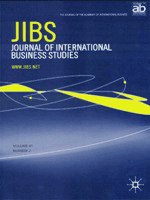The retention of expatriates and repatriates has been and continues to be a major concern for multinational companies. For example, the recent 2010 Brookfield Global Relocation Trends Survey found that, on average, 38% of repatriates voluntary quit within the first year of returning to their home country. However, so far the focus of researchers and managers alike has been to understand why international assignees leave the organization, either during or after their assignment. In my latest study in collaboration with Maria Kraimer and Anne-Wil Harzing (2011) we decided to take a look at the retention concern from a different angle and explicitly investigate what makes international assignees stay. To do so, we collected data from a sample of 143 inpatriates (individuals sent from a foreign subsidiary to the company’s corporate headquarters) from 10 German multinationals over a period of four years. Here is what we found:
First, our study highlights the importance of developing social relationships and sharing similar values with colleagues at the host unit. When assignees are able to build trustworthy relationships with other host-unit employees, they can obtain valuable firm-specific information from them, learn from top performers and get help or advice in their jobs. For example, inpatriates will learn how things are done at the HQ (i.e., the host unit) or learn about the corporate culture. Similarly, feeling a sense of belonging to the host unit, sharing values with local colleagues and identifying with the host unit prevent misunderstandings and increase communication with other colleagues, which also helps assignees gain professionally valuable knowledge from the assignment. In addition to these learning opportunities, social relationships and shared values also improve assignees’ career prospects in the company. For example, social ties with HQ managers can be beneficial for inpatriates’ future career possibilities by increasing their positive exposure and visibility in the HQ, and receiving career sponsorship. Specifically, we found that international assignees that had more trusting relationships with host-unit staff perceived greater career prospects in the company. Similarly, if assignees’ values match those of other colleagues, assignees are better able to understand their current role and what is required to advance in the organization, hence increasing their career prospects.
Second, we found that assignees’ social relationships and shared values predict retention 2 and 4 years later only indirectly through their effect on perceived career prospects and firm-specific learning. Specifically, perceived career prospects had a direct effect on retention. In other words, employees who see future career opportunities in the organization are less likely to leave. This is because, as long as the individual stays in the organization, career opportunities are a benefit that would be sacrificed when leaving. However, career opportunities are not always critical for retention. Interestingly, our results show that having acquired a lot of firm-specific knowledge during the assignment has a compensatory effect. If an assignee has developed a lot of skills that are particularly useful in the current company, he or she will be interested in using this new knowledge upon repatriation and thus stay, irrespective of whether career prospects exist or not. This is because leaving the company would mean sacrificing these firm-specific skills. Only if firm-specific learning is low are career prospects important.
Our study has a number of important implications for expatriate and repatriate retention in multinationals. First, companies need to enhance assignees’ socialization at the host unit through different sources, such as induction programs, ongoing training and social activities. This also requires explicitly involving host-unit staff in the process. Second, it is important for companies to offer assignees rich learning opportunities and integrate international relocations into logical career paths. Finally, multinationals would benefit from using host-country mentors who can provide career support to assignees, help in assessing career prospects and share their own social relationships and knowledge with the assignees.
Further reading:
Brookfield Global Relocation Services. 2010. Global relocation trends: 2010 survey report. Toronto, Canada: Brookfield Global Relocation Services.
Lazarova, M., & Cerdin, J. L. (2007). Revisiting repatriation concerns: Organizational support versus career and contextual influences. Journal of International Business Studies, 38(3): 404–429.
Reiche, B.S., Kraimer, M.L., & Harzing, A.-W. (2011). Why do international assignees stay? An organizational embeddedness perspective. Journal of International Business Studies, 42(4): 521-544.
Stroh, L. K. (1995). Predicting turnover among repatriates: Can organizations affect retention rates? International Journal of Human Resource Management, 6: 443-456.


